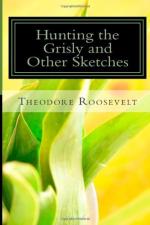Two days after this even, a war party of Comanches swept down along the river. They “jumped” a neighboring camp, killing one man and wounding two more, and at the same time ran off all but three of the horses belonging to our eight adventurers. With the remaining three horses and one wagon they set out homeward. The march was hard and tedious; they lost their way and were in jeopardy from quicksands and cloudbursts; they suffered from thirst and cold, their shoes gave out, and their feet were lamed by cactus spines. At last they reached Fort Griffen in safety, and great was their ravenous rejoicing when they procured some bread—for during the final fortnight of the hunt they had been without flour or vegetables of any kind, or even coffee, and had subsisted on fresh meat “straight.” Nevertheless, it was a very healthy, as well as a very pleasant and exciting experience; and I doubt if any of those who took part in it will ever forget their great buffalo-hunt on the Brazos.
My friend, Gen. W. H. Walker, of Virginia, had an experience in the early ’50’s with buffaloes on the upper Arkansas River, which gives some idea of their enormous numbers at that time. He was camped with a scouting party on the banks of the river, and had gone out to try to shoot some meat. There were many buffaloes in sight, scattered, according to their custom, in large bands. When he was a mile or two away from the river a dull roaring sound in the distance attracted his attention, and he saw that a herd of buffalo far to the south, away from the river, had been stampeded and was running his way. He knew that if he was caught in the open by the stampeded herd his chance for life would be small, and at once ran for the river. By desperate efforts he reached the breaks in the sheer banks just as the buffaloes reached them, and got into a position of safety on the pinnacle of a little bluff. From this point of vantage he could see the entire plain. To the very verge of the horizon the brown masses of the buffalo bands showed through the dust clouds, coming on with a thunderous roar like that of surf. Camp was a mile away, and the stampede luckily passed to one side of it. Watching his chance he finally dodged back to the tent, and all that afternoon watched the immense masses of buffalo, as band after band tore to the brink of the bluffs on one side, raced down them, rushed through the water, up the bluffs on the other side, and again off over the plain, churning the sandy, shallow stream into a ceaseless tumult. When darkness fell there was no apparent decrease in the numbers that were passing, and all through that night the continuous roar showed that the herds were still threshing across the river. Towards dawn the sound at last ceased, and General Walker arose somewhat irritated, as he had reckoned on killing an ample supply of meat, and he supposed that there would be now no bison left south of the river. To his astonishment, when he strolled up on the bluffs and looked over the plain, it was still covered far and wide with groups of buffalo, grazing quietly. Apparently there were as many on that side as ever, in spite of the many scores of thousands that must have crossed over the river during the stampede of the afternoon and night. The barren-ground caribou is the only American animal which is now ever seen in such enormous herds.




